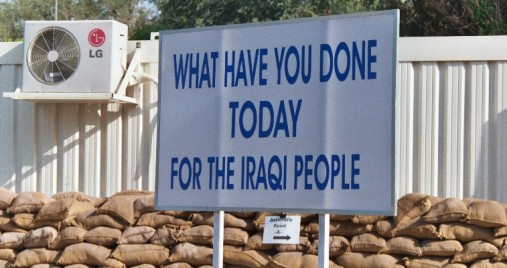Iraq’s problems are not timeless. The U.S. is responsible.
Boston Review
Eight years ago, Nir Rosen made a startling prediction in the pages of Boston Review:
Sunnis will be cleansed from Baghdad. And the Shias will go to war against Sunnis. The Kurds, having waited for this opportunity, will secede.
Today, with the Islamic State of Iraq and Syria (ISIS) taking over cities in Iraq one by one, Rosen’s words have proven true. Though, as it turns out, it is the Sunnis going to war against the Shias. And, while the Sunnis (thankfully) have not quite been “cleansed” from Baghdad, the Shia/Sunni conflict has been unrelenting, and Nouri al-Maliki’s sectarian policies seem to have prompted the most recent rounds of violence. (Even the Kurds are taking advantage of the conflict to secure land.)
How was Rosen able to make such a prescient statement? While critics blame Obama’s policies for the deteriorating situation, Rosen agrees with Nancy Pelosi, who said the current crisis “represents the failed policies that took us down this path 10 years ago.” Rosen, who was an independent, unembedded reporter in Iraq on and off for two years, writes:
When Baghdad fell, on April 9, 2003, and widespread violence erupted, the primary victims were Iraq’s Sunnis. For Shias, this was justice. “It is the beginning of the separation,” one Shia cleric told me with a smile in the spring of 2003. Saddam had used Sunni Islam to legitimize his power, building one large Sunni mosque in each Shia city in the south; these mosques were seized by Shias immediately after the regime collapsed. . . .
Some realignment of power was inevitable after Saddam’s removal, and perhaps not even shared opposition to the American occupation could have united Sunnis and Shias. As it happened, the occupation divided Iraqis between those seen as anti-occupation and those seen as pro-occupation.
For Rosen, the seeds of this conflict were planted from the beginning, and “enshrined” by United States’s attempt to democratize Iraq, as sectarian parties failed to win seats:
The American sectarian approach has created the civil war [in Iraq]. We saw Iraqis as Sunnis, Shias, Kurds. We designed a governing council based on a sectarian quota system and ignored Iraqis (not exiled politicians but real Iraqis) who warned us against it. We decided that the Sunnis were the bad guys and the Shias were the good guys. These problems were not timeless. In many ways they are new, and we are responsible for them. The tens of thousands of cleansed Iraqis, the relatives of those killed by the death squads, the sectarian supporters and militias firmly ensconced in the government and its ministries, the Shia refusal to relinquish their long-awaited control over Iraq, the Kurdish commitment to secession, the Sunni harboring of Salafi jihadists—all militate against anything but full-scale civil war.
Indeed, in 2003, Juan Cole pointed to the U.S. preference for Shias:
In removing the Baath regime and eliminating constraints on Iraqi Islamism, the United States has unleashed a new political force in the Gulf: not the upsurge of civic organization and democratic sentiment fantasized by American neoconservatives, but the aspirations of Iraqi Shiites to build an Islamic republic.
But in the next breath, he makes it clear how unlikely it was that the Shias could remain in control:
To be sure, the dreams of a Shiite Islamic republic in Baghdad may be unrealistic: a plurality of the country is Sunni, and some proportion of the 14 million Shiites is secularist.
And even before the United States entered Iraq, John W. Dower, reflecting on the experience of postwar Japan, told us not “expect democracy in Iraq”: “Put simply, one of the reasons the reformist agenda succeeded is that Japan was spared the type of fierce tribal, religious, and political factionalism that exists in countries like Iraq today.” He writes:
I have no doubt that huge numbers of Iraqis would welcome the end of repression and establishment of a democratic society, but any number of considerations make the situation there very different than it was in Japan. Apart from lacking the moral legitimacy and internal and global support that buttressed its occupation of Japan, the United States is not in the business of nation-building any more—just look at Afghanistan. And we certainly are not in the business of promoting radical democratic reform. Even liberal ideals are anathema in the conservative circles that shape U.S. policy today.
The central tensions in Iraq, sadly, seem nowhere close to being solved. It is just as true now as it was in 2006 when Rosen was writing, and in 2003 when we entered Iraq, that:
The once confident and aggressive Sunnis now see the state as their enemy. They are very afraid. All Iraqis are.





